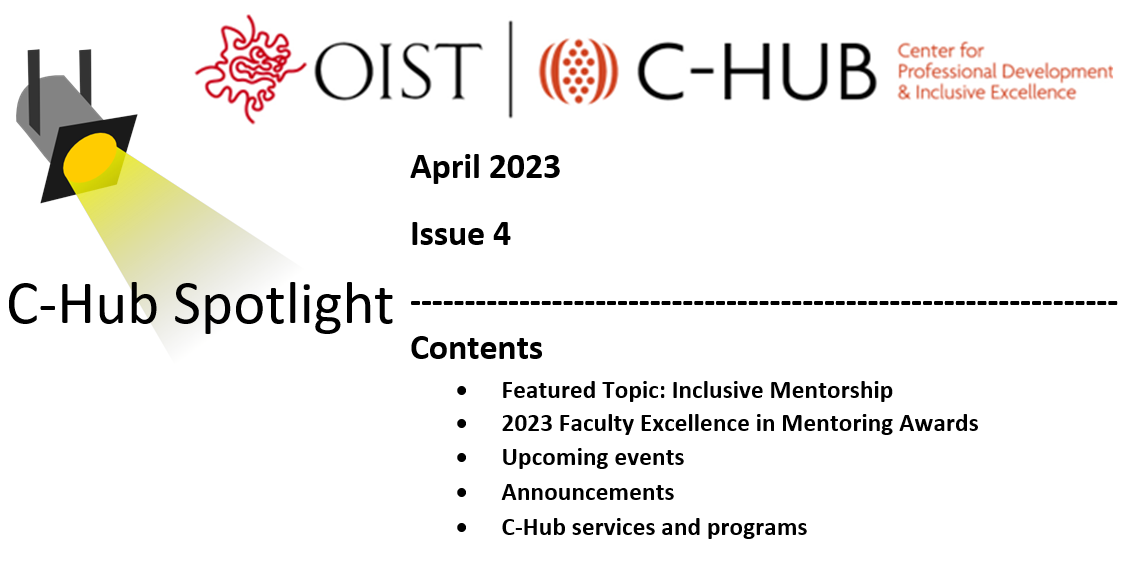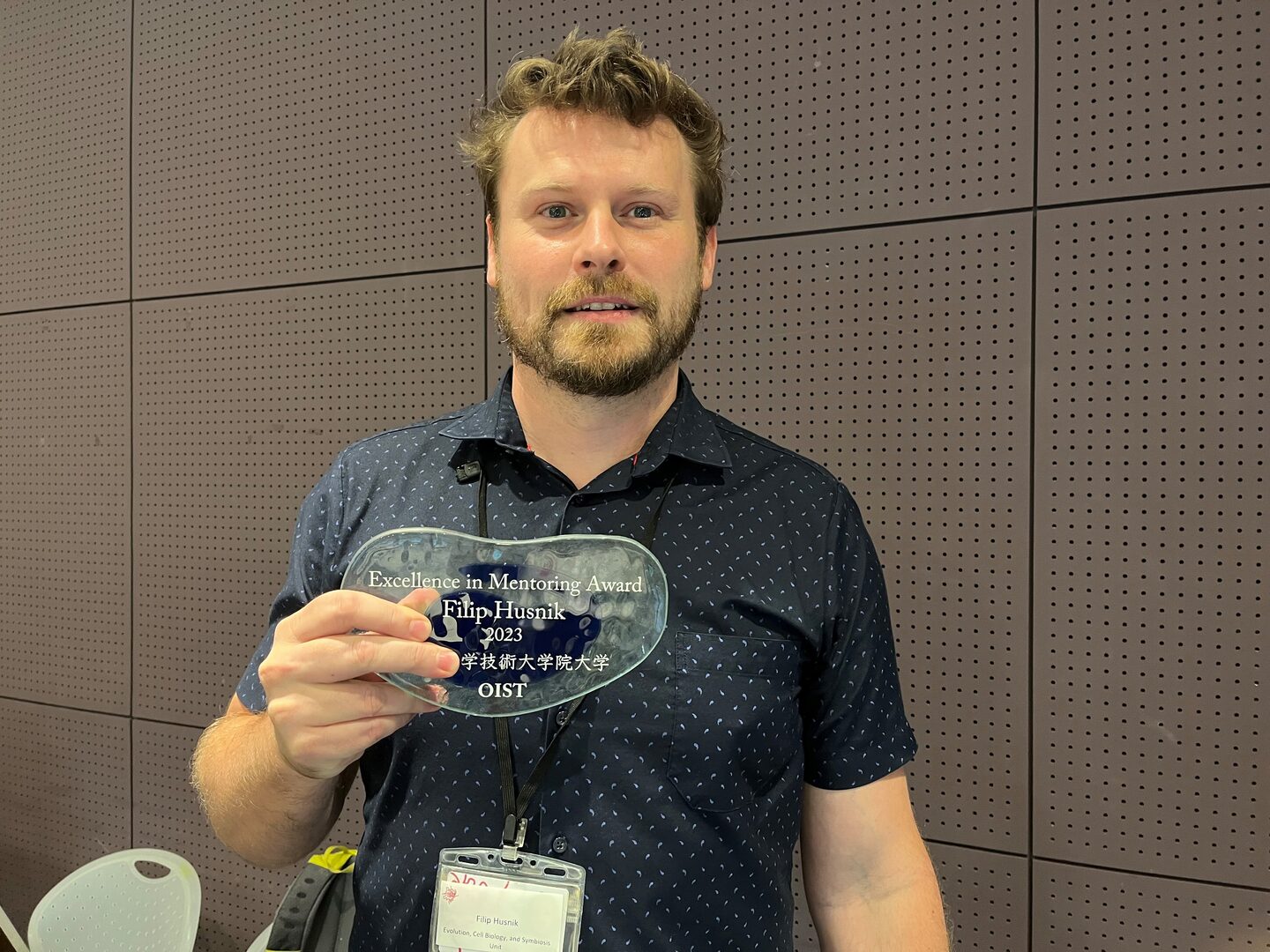C-Hub Spotlight, Issue 4, April 2023

Featured Topic: Inclusive Mentorship
Innovation, creativity, and excellence is crucially dependent upon our ability to diversify and foster the talent pool of our scientists, educators, and workforce across all professions. For institutions to succeed in this regard, all members must take responsibility to cultivate climates that are inclusive, equitable, and allow all individuals to thrive. Inclusive mentorship is paramount and necessary for successful, flourishing teams, productive collaboration and communication, and continues to impact subsequent generations of mentors and mentees. It is engendered in various forms – advocacy, empowerment, active listening and ongoing communication, peer mentorship, empathy, a willingness and stance to continue learning, and the important influence and positive impact of those that can use their privilege or power to support those that are underrepresented or invisible (Takayama, in prep.). Inclusive mentorship develops confidence and a sense of belonging in mentees. Inclusive mentorship allows mentors to expand upon new perspectives and strengthen their sense of commitment, communication, and leadership skills. Institutions benefit from inclusive mentorship through increased sense of community, enhanced productivity, and the cultivation of current and future leaders.
What’s the evidence?
Research has demonstrated that students who had a mentor and had professors that made them excited about learning were nearly three times as likely to be thriving and possess a strong sense of well-being in comparison to those who did not feel supported. Effective mentoring is highly predictive of an individual’s success, and inclusive mentoring is crucial for professional success throughout the career trajectory. It is even more critical for women and other underrepresented populations. Studies have shown that formal mentoring is more effective than informal mentoring: productivity is increased by formal mentorship, and mentoring relationships continue longer and are better sustained in formal mentorship situations. Yet, there is an assumption that informal, or “natural” mentoring in the workplace or research environment is sufficient. Furthermore, dyadic pairings (1:1) of mentor and mentee are less effective and can introduce a power differential.
Peer mentoring is a highly effective mentoring practice, resulting in long-term impact through the creation of strong networks whose members comprise a diverse collection of professional and personal experience, expertise, and backgrounds. Peer Mentoring Circles (PMCs) are particularly effective, whereby a group of colleagues/peers meet regularly to exchange professional experiences, challenges, interests, and goals for the purpose of sharing and discussing strategies or resources, and creating a collegial, supportive community to mentor and learn from each other. Over time, PMCs establish a strong sense of community and members continue to support one another in various iterations throughout their career. For information on C-Hub’s Peer Mentoring Circle Program, visit this page.
What can YOU do?
Below are suggested best practices for inclusive mentorship.
For mentors:
- Collaboratively develop clear, realistic mentoring goals and strategies at the beginning of the mentor-mentee partnership.
- Collaboratively develop clear and transparent communication goals and processes.
- Provide constructive feedback.
- Establish accountability and regularly review progress on the mentoring relationship.
- Listen actively and intentionally.
- Be aware of your implicit (unconscious) biases.
- Create an environment of trust and respectful, open communication.
For mentees:
- Actively collaborate in the identification of realistic goals.
- Clear communication.
- Listen actively and intentionally.
- Identify your mentoring needs.
- Build your mentoring networks/constellations.
- Be aware of your implicit biases.
To learn about C-Hub’s past symposium on Inclusive Mentoring, visit this page.
2023 Faculty Excellence in Mentoring Awards
Congratulations to Professor Filip Husnik, the 2023 Faculty Excellence in Mentoring Awardee, and to Professor Christine Luscombe, Honorable Mention Awardee.
The award honors OIST faculty who have demonstrated a sustained commitment to engender effective mentoring relationships, and their ongoing efforts to cultivate productive, inclusive research environments. Sponsored by the Faculty Affairs Office, the award recognizes the paramount role that inclusive mentoring plays in the professional development and career advancement of OIST students, postdoctoral scholars, and research staff, and the lifelong impact of excellent mentors.
To read our awardee citations and to learn more about the award, visit our Faculty Excellence in Mentoring Award Page.

Upcoming Events:
- The 2nd Study Session for OIST Administrative Staff “Research Areas of Science and Technology” will be held on Thursday, May 25, 13:30-14:30 by Dr. Mizuki Shimanuki (Office of the Provost) and Ayumi Nagai (C-Hub). This series of sessions are for members in the administrative and management divisions to provide basic overall knowledge of OIST’s research activities, and to connect the understanding to a broader perspective of their role in the organization. The first 5 sessions are offered in Japanese, and English sessions will be held from September to December. Find more about the series here.
Announcements:
- The 2023 Faculty Retreat was held last Friday, April 14. Altogether, twenty-nine faculty members participated. The goal was to provide an opportunity for faculty to gain greater familiarity with the breadth of research being carried out across the university. Faculty discussed and strategized potential areas of connection for new interdisciplinary partnerships and collaborations. A special thanks to professors Ulf Dieckmann and Lauren Sallan for their input in planning and putting together this year’s agenda. Learn more on the C-Hub Faculty Retreat page here.
- C-Hub has been producing this newsletter since January, 2023. We would like to enhance it with your suggestions. Please provide your feedback with a concrete suggestion for future newsletter content. The first eight submissions will receive a free hardcopy of Ann Rolfe’s well-cited handbook on mentoring, Mentoring: Mindset, Skills, and Tools. Please submit your feedback here.
- The C-Hub has an extensive and interesting collection of books on mentoring, teaching and learning, and other professional development topics that you can check out. See that list here. [*Note, this is only open to OIST members.]
- The latest cohort of the C-Hub Teaching and Course Design Certificate Program finished March 17. For those participants who completed all the requirements, a certificate will be issued in May. Please see photos of the last session of the certificate program here.
C-Hub Services and Programs:
C-Hub provides individual consultations for all members of the OIST community on a broad range of topics including career consultations, pedagogy, course and syllabus design, CVs and resumés (for the academic and non-academic job market), teaching portfolios and statements, DEI (diversity, equity, & inclusion), CliftonStrengths Coaching, work-life balance, etc. For more information, visit our Consultations and Coaching page here. C-Hub offers regularly scheduled programs, such as the Teaching and Course Design Certificate Program, and Peer Mentoring Circles Program. Watch this space for future announcements.
References and Further Reading:
Gallup-Purdue Index (2014). Great jobs great lives. Washington, DC: Gallup, Inc.
Pololi, L. H., & Evans, A. T. (2015). Group peer mentoring: an answer to the faculty mentoring problem? A successful program at a large academic department of medicine. Journal of Continuing Education in the Health Professions, 35(3), 192-200.
Kuhn,, C. & Castaño, Z. (2016). Boosting the career development of postdocs with a peer-to-peer mentor circles program. Nature Biotechnology 34(7), 781–783.
Lee, A., Dennis, C. & Campbell, P. (2007). Nature's guide for mentors. Nature 447, 791–797.
van Emmerik, I.J.H. (2004). The more you can get the better: Mentoring constellations and intrinsic career success. Career Development International 9, 578-594.



